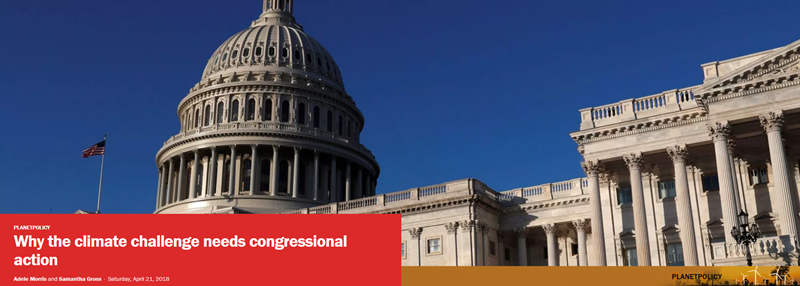
Why the climate challenge needs congressional action
Adele Morris and Samantha Gross
Saturday, April 21, 2018
President Trump has aimed to undo much of the Obama administration’s policy on energy and climate. This includes announcing a withdrawal from the Paris Climate Agreement, repealing the Clean Power Plan, rolling back vehicle fuel economy standards, attempting to rescind rules on methane emissions from oil and gas production on federal lands, ending the moratorium on coal leasing on federal lands, and opening additional offshore areas to oil and gas leasing.
Each of these undoings shares a common quality: The Obama administration initiated them through regulation or executive order. One could argue that any of the leading candidates in the 2016 Republican primary would have taken similar actions in the climate and energy space. What is needed now, we argue, is momentum toward bipartisan climate legislation in Congress that could outlast the back-and-forth on regulations.
WHAT’S DONE BY AN ADMINISTRATION CAN BE UNDONE
After the demise of the Waxman Markey legislation in 2009—which would have capped U.S. greenhouse gas emissions—most of the environmental community put all of its eggs in the basket of Obama administration regulation, particularly under the Clean Air Act. Millions of charitable dollars were spent championing the Clean Power Plan and funding climate advocacy for regulatory action.
However, those of us who understand the regulatory process knew the risks of this strategy. Creating a rule, particularly when it seeks to add economically significant new constraints, is incredibly time consuming and involves years of analysis, public comment, interagency coordination, and state implementation. The process is especially subject to litigation when the statutory authority is untested, as it was with Section 111(d) of the Clean Air Act, the basis for the Clean Power Plan.
In contrast, unravelling a rule to remove or reduce regulatory obligations is fairly easy. The administration is likely to be sued when rolling back regulation, but the default is for the new deregulatory language to take effect while the legal case to retain regulation works its way through a years-long process.
Even if litigation to maintain regulation prevails, the administration has great discretion about its stringency. In the case of climate regulation, the Trump administration has revised the social cost of carbon downward, in part by raising the discount rate used to monetize future damages and by reducing the scope of analysis to climate impacts within the borders of the United States. With those changes, stringent emissions standards are unlikely to pass a cost-benefit test.


































